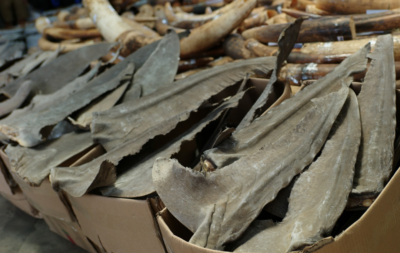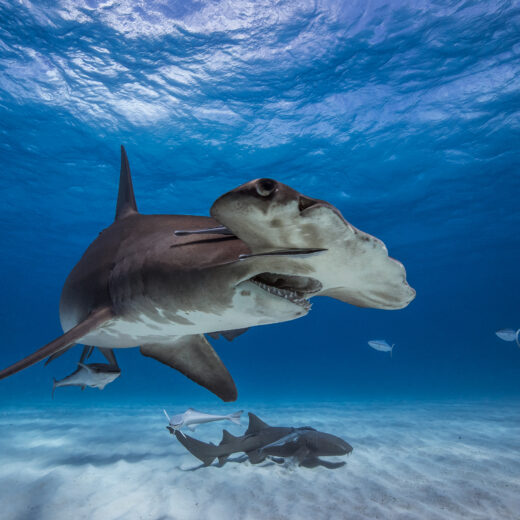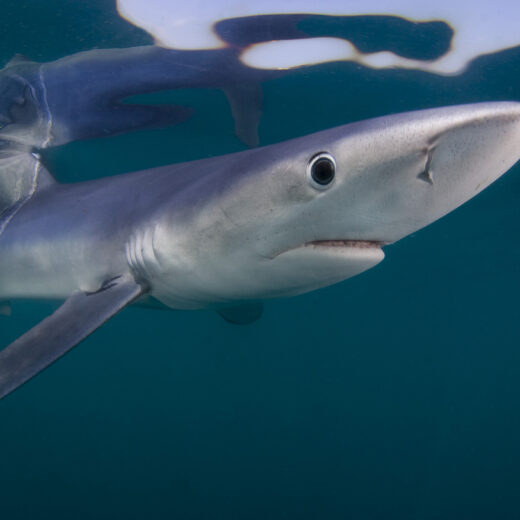
Global shark catch levels have more than doubled since 1960 and populations of some threatened species, such as hammerhead and oceanic whitetip, have declined by over 90 percent in recent years, according to a new paper published in Marine Policy.
The study, conducted by researchers from the University of Hong Kong SAR, the Sea Around Us Initiative at the University of British Columbia and WildAid, reveals that fishing pressure on threatened shark populations has increased dramatically, and it is now more urgent than ever that consumers reject shark fin products.
Data from the Sea Around Us shows the global shark catch has more than doubled to 1.4 million tonnes the in last six decades, with the overexploitation “threatening almost 60 percent of shark species, the highest proportion among all vertebrate groups,” said lead author Prof. Yvonne Sadovy, of SWIMS/HKU.
Hong Kong SAR, added Sadovy, is the port of entry for about half of all globally traded dried shark fins, where they are often re-exported to mainland China. A 2017 study showed that 33 percent of shark fins found for sale in Hong Kong SAR’s dried seafood stores were from species listed as Threatened by the International Union for Conservation of Nature.
The potentially sustainable catch of elasmobranchs (sharks, rays, and chimaeras), meanwhile, has been “estimated at 12 percent of the total elasmobranch catch,” says the report, or “33 out of the 537” existing shark species.
Over the past several years, dozens of countries have adopted bans on shark fishing. However, given the prevalence of illegal, unregulated, and unreported fishing, and the fact that most countries still do not ban finning, the practice continues globally.
Faced with challenges such as poor enforcement, accidental catch, inadequate laws, and criminal activity, the researchers call for adopting the precautionary principle and halting the consumption and trade in all shark fin.
“The global shark fin industry is rife with criminal activity and cannot be trusted to police itself effectively,” said study co-author Alex Hofford, a wildlife campaigner for WildAid in Hong Kong SAR. “Ensuring truly sustainable shark fisheries and shark fin trade remain a far-off pipe dream. Simply put, around a quarter of all shark species are hurtling towards extinction. As our paper clearly shows, the only real way to protect sharks is to adopt the precautionary principle and halt the consumption and trade in all shark fin. Furthermore, Hong Kong SAR’s irresponsible restaurant sector – including Maxim’s Catering Limited, should refrain from selling and serving shark fin immediately which is directly contributing to the endangerment of shark species.”
Sharks and rays are the main ingredient for shark fin soup, a prestigious dish among ethnic Chinese both in China and abroad, served at wedding banquets, Lunar New Year celebrations, and high-end restaurants. The demand among an expanding middle class in places like Vietnam and Indonesia is driving unsustainable fishing in unmanaged fisheries of less economically developed countries.
“Shark finning and the mixing of catches tend to take place in the open seas or in remote ports, where there is little to no oversight,” said co-author Dr. Daniel Pauly, Principal Investigator with the Sea Around Us at UBC. “Moreover, authorities show little interest in controlling illegal wildlife trade, including that in shark fins. Even if they do, their enforcement capabilities are very limited because they cannot inspect and run DNA tests on every single fin that arrives at their customs to determine the area where the shark was caught, or even determine the species.”
Stay in touch and get the latest WildAid updates.
SIGN UPAbout WildAid
WildAid is a non-profit organization with a mission to protect wildlife from illegal trade and other imminent threats. While most wildlife conservation groups focus on protecting animals from poaching, WildAid primarily works to reduce global consumption of wildlife products such as elephant ivory, rhino horn and shark fin soup. With an unrivaled portfolio of celebrity ambassadors and a global network of media partners, WildAid leverages more than $308 million in annual pro-bono media support with a simple message: When the Buying Stops, the Killing Can Too.
Journalists on deadline may email communications@wildaid.org


